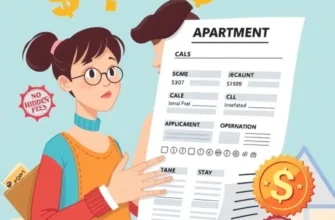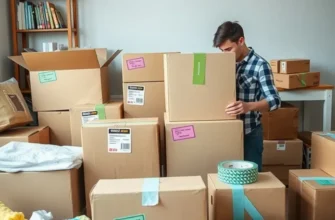Moving into a new apartment is as exhilarating as it is nerve-wracking, especially if you’re a first-time renter. You’ve probably daydreamed about your chic decor and how many pizza boxes you can stack before needing a moving truck. But hold on; before you can put your feet up and uncork that celebratory bottle of bubbly, you need to navigate the territory of apartment deposits. Don’t let this key step turn into a comical tragedy! Understanding what a deposit is, how much you might need, and the dos and don’ts can save you loads of stress—and cash. Let’s break it all down and turn this potential headache into a well-oiled moving experience with plenty of laughs along the way.
Understanding the Deposit Dilemma

Securing an apartment often begins with the landlord requiring a deposit—a tangible expression of commitment and a safeguard against potential mishaps. The deposit serves as a financial buffer for landlords, ensuring that any damage or unpaid rent is covered without lengthy disputes.
For first-time renters, understanding the typical amounts involved can ease the process. Typically, security deposits range from one to two months’ rent, depending on the local market and the specifics of the rental agreement. In some highly competitive areas, landlords may request more, whereas in areas with less demand, a single month’s rent might suffice.
Budgeting for a deposit is crucial for aspiring renters. Planning in advance by setting aside funds specifically for this purpose will prevent last-minute scrambles. Think of it as a necessary initial investment in your new home journey. You might even consider integrating this with your broader financial strategy as discussed here.
Avoiding pitfalls starts with transparency. Always request a detailed breakdown of any fees labeled under the deposit banner. Sometimes, additional fees such as “move-in” or “cleaning fees” are bundled with the deposit, making the overall cost appear deceptively high. Ask questions—these inquiries could save you from unnecessary expenditures.
Ensure you also know the conditions under which your deposit might be forfeited or diminished. Common causes for a reduced deposit return include property damage, unapproved alterations, and unpaid utilities. Clearly understand these stipulations before signing your lease.
Remember, the deposit process is a standard yet essential facet of renting—a process that becomes second nature with a bit of preparation and awareness. Much like navigating the quirks of new technology, mastering deposits can be straightforward once you grasp the fundamentals.
The Great Deposit Playbook

Navigating the deposit process can feel like stepping onto a financial minefield, but it doesn’t have to be. With the right moves, securing your apartment without parting with extra dollars is possible. Timing and strategy play a significant role in ensuring a smooth deposit experience.
Knowing When to Deposit:
The first step is understanding when to make your deposit. Typically, deposits are due upon signing the lease, but verifying with your potential landlord is wise. Submitting a deposit too early might leave you vulnerable if the deal falls through or the terms change. Confirm all lease details are satisfactory before handing over any money.
Negotiating Terms:
Don’t shy away from negotiating your deposit terms. Ask about reduced deposits, especially if renting during off-peak seasons or if you have a strong rental history. Mention your excellent credit score or steady income, which might persuade a landlord to lower your deposit or allow a payment plan. For more tips on improving your credit, you might want to explore our renter credit improvement tips.
Document Everything:
Keeping comprehensive records is crucial. Upon moving in, document the apartment’s condition meticulously. Take detailed photos or videos of every room and note existing damages. This documentation serves as your primary evidence and helps ensure you aren’t penalized for pre-existing issues when moving out.
Maintain a checklist of any commitments made by the landlord. Have them confirmed in writing, specifying timelines for repairs or improvements, if applicable. Emails work great for this purpose, as they provide a time-stamped trail of correspondence.
Understand Your Lease Terms:
Read your lease thoroughly to understand the conditions under which your deposit might be withheld. Common pitfalls include failing to give proper notice or leaving the apartment in a non-marketable condition. Avoid surprises by discussing these terms with your landlord beforehand.
Ensuring a Smooth Move-Out:
When preparing to move out, revisit your initial documentation and compare it with your apartment’s current state. Address any damages you might have caused and consider hiring a professional cleaner for a spotless move-out cleaning. A clean apartment typically results in a smoother deposit return.
Schedule a walk-through with your landlord before the final handoff. This proactive step allows you to address any potential issues on the spot and provides an opportunity to discuss your deposit’s return.
With these strategies in place, you’ll master the deposit game, keeping your financial health—and sanity—intact as you embark on your new housing adventure.
Final words
Jumping into the world of renting can feel like a scene from a sitcom. But once you grasp the role of deposits, you’ll find it’s less about scrambling for spare coins and more about making smart decisions. By understanding who gets what and when, how to navigate the negotiations without losing your cool, and the steps to ensure your hard-earned cash doesn’t disappear into a black hole, you’ll be ready to unleash your inner real estate mogul. Soon, you’ll conquer the apartment rental market with a blend of savvy skills and a cheeky smile. Happy renting!









